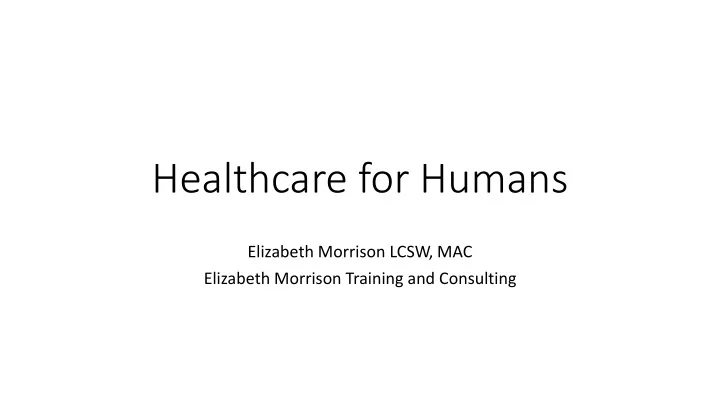

Healthcare for Humans Elizabeth Morrison LCSW, MAC Elizabeth Morrison Training and Consulting
• Image; photo of my husband and son;
Image of patient, Lori
Do we really need to talk about Empathy? • We are already in this field because we have deep concern for others • We already work for organizations with mission statements to be in service to those who need it most • We already sometimes feel heavy or drained with worry and empathy for others
• Image of being burdened cascade of these initials: PCMH, ACA, TIC, WPC, Health Homes, PRIME, SBIRT • Image of being buried by electronic health record work on the computer
So ….why talk about Empathy in H ealthcare? As a field we don’t always do a very good job of demonstrating empathy.
• Images of command signs
• Image of cold waiting room
• Image of person in hospital gown on an exam table
• Image of an ER
• Image of garbage in a parking lot outside healthcare setting
• Image of receptionist behind glass, not looking up
Feeling empathy doesn’t correlate to conveying empathy
• Picture of my mom
What is empathy? Compassion Rapport • Word bucket: Trauma-informed care Caring Humility Kindness Understanding Respect Good will Therapeutic-alliance Perspective-taking
Impact of Empathy • Picture of Carl Rogers
Impact of Empathy on Treatment Outcomes • Diabetes • Obesity • Depression • Addictive Disorders • Pain Control • Anxiety
Impact on Diagnostic Accuracy • Increases client/patient self disclosure • Judgement clouds diagnostic decisions
Impact on grievances and litigation • Lowers client complaints and grievances • Protective of litigation
Impact on us • Cognitive empathy vs. affective empathy • Cognitive empathy = perspective taking, lack judgement • Affective empathy = feeling the same feeling as the other
Impact on us • Related to sick days out of work • Protective of burn out • Decreases unpleasant interactions • Increases rewarding interactions • Improvements in job satisfaction
Skillful empathy conveyance is …. • Treatment • An evidenced based practice • Practice based evidence • Professional obligation • An organizational imparative
What are core evidenced based empathy techniques? • Open ended questions • Reflective listening • Affirmations • Acknowledgement of feelings • Mirroring
Avoid ….. • Conveying Judgement
Limiting …. • Advice “You should…..” • Cheerleading “you’ll get through it, I know how strong you are” • Reassurance “don’t worry, he’ll be fine” • Trying to change feelings “Don’t cry, think positive….”
Environmental Empathy • Eye contact, goodwill greeting, smile at reception • Attention to atmosphere: lighting, temperature, beauty • Limit disrepair, disorganization, neglect • Avoid command signs
Empathy conveyance is: • Teachable • Measurable • Improvable
Advancing Empathy in our organizations • Integrate empathy skills in job descriptions • Hire for empathy skills • Evaluate for empathy skills • Train for empathy skills • Create spaces and processes that facilitate empathy • Decrease empathy conveyance barriers
• Last slide, image; closing
Recommend
More recommend